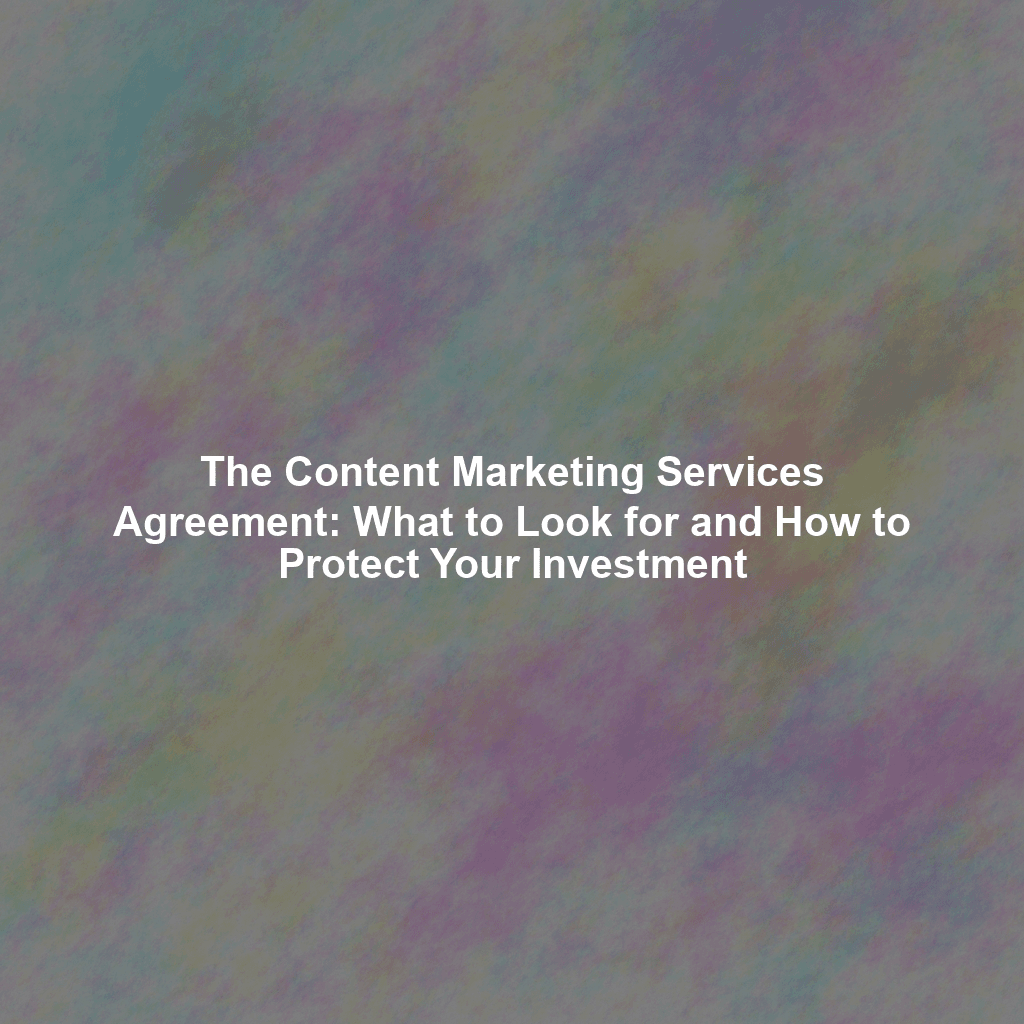Understanding the Importance of a Solid Agreement
A well-drafted content marketing services agreement provides clarity and security. It defines the scope of work, payment terms, ownership rights, and other critical aspects of the relationship. Without a clear agreement, you risk misunderstandings, disputes, and potentially, significant financial losses. Imagine paying for content you don’t own or being stuck with a provider who isn’t delivering as promised – these are the kinds of scenarios a solid agreement can prevent.
Why You Need More Than Just a Handshake
While a good relationship with your content marketing provider is essential, it shouldn’t replace a legally binding agreement. Memory fades, interpretations differ, and personnel change. A written agreement serves as a reliable record of your agreed-upon terms, protecting both you and the provider in the long run.
Key Clauses to Examine Closely
Let’s delve into the critical clauses you’ll encounter in a typical content marketing services agreement:
1. Scope of Work: Defining Deliverables and Expectations
This is perhaps the most important section. It meticulously outlines the specific services the provider will perform. Be sure it covers:
- Types of Content: Specify the types of content to be created (blog posts, articles, videos, social media updates, etc.).
- Quantity and Frequency: Define the number of pieces and how often they will be delivered.
- Topics and Keywords: Clarify the subject matter and relevant keywords the content will address.
- Research and Sourcing: Detail who is responsible for research and sourcing images/data.
- Content Specifications: Outline specific requirements, such as word count, tone, style, and target audience.
- SEO Considerations: Clarify SEO optimization strategies, including keyword integration, meta descriptions, and internal linking.
Tip: The more detailed and specific you are in defining the scope of work, the less room there is for ambiguity and misinterpretation.
2. Ownership of Content: Intellectual Property Rights
This clause determines who owns the copyright to the content created. Ideally, you want to own all rights to the content you’ve paid for. Ensure the agreement includes a clear “work for hire” provision, explicitly stating that the content is created as a “work for hire” and that all ownership rights transfer to you upon completion and payment.
Important Note: If the agreement doesn’t explicitly transfer ownership to you, the provider may retain the copyright, limiting your ability to use, modify, or distribute the content freely.
3. Payment Terms: Defining Costs and Payment Schedules
This section details the pricing structure, payment schedule, and acceptable payment methods. Consider these points:
- Pricing Model: Is it a fixed fee per piece, an hourly rate, or a retainer-based agreement?
- Payment Schedule: When are payments due? (e.g., upon delivery, monthly, or in installments).
- Late Payment Penalties: What are the consequences of late payments?
- Expenses: Who is responsible for covering expenses, such as stock photos or software subscriptions?
- Taxes: Are taxes included in the quoted price?
Negotiation Tip: Negotiate a payment schedule that aligns with project milestones. Consider tying payments to specific deliverables and satisfactory performance.
4. Revision Policy: Ensuring Quality and Satisfaction
A comprehensive revision policy is crucial to ensure you’re satisfied with the final product. The agreement should outline:
- Number of Revisions: How many rounds of revisions are included?
- Revision Timeframe: How long do you have to request revisions?
- Scope of Revisions: What types of changes are allowed within the revision rounds?
- Additional Costs: Are there additional charges for revisions beyond the included rounds?
Best Practice: Provide clear and constructive feedback during the revision process to avoid unnecessary delays and ensure the content meets your expectations.
5. Termination Clause: Defining Exit Strategies
Life happens, and sometimes, you need to terminate the agreement. The termination clause should clearly define the conditions under which either party can terminate the agreement, including:
- Notice Period: How much notice is required for termination?
- Reasons for Termination: What constitutes a valid reason for termination (e.g., breach of contract, unsatisfactory performance)?
- Payment Upon Termination: How will payment be handled for work completed up to the termination date?
- Return of Materials: What happens to any materials or data provided to the provider upon termination?
Important Consideration: Understand the implications of terminating the agreement early, including any potential penalties or fees.
6. Confidentiality: Protecting Sensitive Information
If you’re sharing confidential information with your content marketing provider, include a confidentiality clause (also known as a non-disclosure agreement or NDA). This clause ensures the provider will keep your sensitive information private and not disclose it to third parties.
7. Indemnification: Allocating Risk and Liability
An indemnification clause protects you from potential lawsuits or liabilities arising from the provider’s work. This clause typically states that the provider will defend and indemnify you against any claims of copyright infringement, plagiarism, or other legal issues related to the content they create.
Tips for Negotiating Favorable Terms
- Do Your Research: Understand industry standards and typical pricing models.
- Be Prepared to Walk Away: Knowing your bottom line gives you leverage.
- Get it in Writing: Always insist on a written agreement.
- Consult with an Attorney: Seek legal advice to ensure the agreement protects your interests.
- Maintain Open Communication: A collaborative relationship fosters trust and helps avoid disputes.
Building a Mutually Beneficial Relationship
A content marketing services agreement is not just about legal protection; it’s also about establishing a clear framework for a successful partnership. By understanding the key clauses, negotiating favorable terms, and fostering open communication, you can create a mutually beneficial relationship that delivers high-quality content and achieves your marketing goals.
Conclusion
Investing in content marketing is an investment in your business’s future. By taking the time to carefully review and negotiate your content marketing services agreement, you can protect your investment, set clear expectations, and pave the way for a productive and profitable partnership. Remember, a solid agreement is not just a piece of paper; it’s the foundation for a successful content marketing strategy.
 Skip to content
Skip to content

